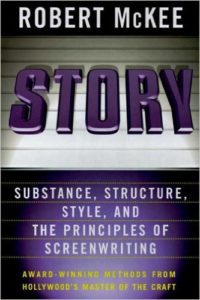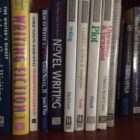 Behind the Scenes is a series of occasional posts about my efforts to write a new thriller (working title, Book 3) and about the challenges, setbacks — and perks — of returning to a writing life. Today, the second of two parts from Robert McKee’s Story seminar: How and Why Your Characters Take Control of Your Novel — And What It Really Means
Behind the Scenes is a series of occasional posts about my efforts to write a new thriller (working title, Book 3) and about the challenges, setbacks — and perks — of returning to a writing life. Today, the second of two parts from Robert McKee’s Story seminar: How and Why Your Characters Take Control of Your Novel — And What It Really Means
If you talk to (or read the blogs of) enough authors, pretty soon you’ll find one or two, or a dozen who will swear that their characters make the decisions as to the plotting of their novels. I never believed in this type of literary hijacking – until it happened to me, and I was able to weave in an entire subplot into Book 3 as a result.
But it wasn’t until story guru, Robert Mckee explained the phenomenon that I understood what had happened.
Not A ‘Mystical’ Process
 In this Behind the Scenes series (in which I explore how writing fiction and the world of publishing has changed for me since I had two novels published two decades ago,) I have already written about attending McKee’s 3-day Story seminar so that I could decide if, in Book 3, I have a good story to tell.
In this Behind the Scenes series (in which I explore how writing fiction and the world of publishing has changed for me since I had two novels published two decades ago,) I have already written about attending McKee’s 3-day Story seminar so that I could decide if, in Book 3, I have a good story to tell.
This post takes the question (and answer) a step further and attempts to extrapolate from McKee’s teaching the elements of a great original story. According to McKee, you are on your way to telling a great original story when your characters “suddenly spring to life, and of their own free will are making choices and taking actions” But, says McKee, there is nothing “mystical” about this process.
Instead, he explains it as follows: “The sudden impression that the story is writing itself simply marks the moment where a writer’s knowledge of the subject has reached saturation point . The writer becomes god of his little universe, and is amazed by what seems to be spontaneous creation, but is in fact reward for hard work.”
Research is Key
And how does a writer reach that saturation point?
McKee has a one-word answer: Research.
“Experience and imagination will never be enough,” he tells us at the seminar. “You have to do research. You have to read.” These are steps in the creation process that McKee quaintly refers to as making a “trip to the library” but which of course these days may be conducted online either by Googling or purchasing e-books on Amazon.
 McKee is adamant that reading and research is crucial to the writing of a truly great original story. In an aside (of which there are many during the three day seminar, raising it to a vastly entertaining experience) McKee tells us about a seminar attendee who disagreed with the idea of reading and research because he didn’t want anything to “interfere with the creative process.” McKee pauses, glaring from beneath his bushy eyebrows, and then declares (with the same contempt he reserves for Disneyworld and the musical Les Miserables): “Any stupid idea like that which makes its way out into the world was born in an American university.”
McKee is adamant that reading and research is crucial to the writing of a truly great original story. In an aside (of which there are many during the three day seminar, raising it to a vastly entertaining experience) McKee tells us about a seminar attendee who disagreed with the idea of reading and research because he didn’t want anything to “interfere with the creative process.” McKee pauses, glaring from beneath his bushy eyebrows, and then declares (with the same contempt he reserves for Disneyworld and the musical Les Miserables): “Any stupid idea like that which makes its way out into the world was born in an American university.”
A Small Knowable World
For McKee, research allows you to become the god of the world you are writing about . This may be obvious to authors of fantasy and science fiction, but as McKee makes clear research is a must for a writer in any genre. “The first step towards a well-told story is a small knowable world. You must be the expert and authority on your characters and the world they inhabit .” Or, as he amplifies in his book, Story: “so that no-one [can] raise a question that you couldn’t answer instantly about your world – from the eating habits of your characters to the weather in September.”
“The more complete the knowledge, the greater an author’s creative choices. A writer who does not know his/her characters or setting only has a tourist’s knowledge, and therefore will have to fall back on using cliches.”
Writing Experts Agree
 Thriller writer, Timothy Hallinan (author of the Poke Rafferty series) agrees. In his series, Finish Your Novel, he writes in a section titled Listening to Your Characters: “If you’ve put some work into your fictional people, at some point in the writing of your book, they will begin to move around on their own.” He continues, “Listen to your characters […] If you ignore your characters’ resistance and force them to do what you want […] you’re in danger of writing plot-driven drivel.”
Thriller writer, Timothy Hallinan (author of the Poke Rafferty series) agrees. In his series, Finish Your Novel, he writes in a section titled Listening to Your Characters: “If you’ve put some work into your fictional people, at some point in the writing of your book, they will begin to move around on their own.” He continues, “Listen to your characters […] If you ignore your characters’ resistance and force them to do what you want […] you’re in danger of writing plot-driven drivel.”
Hallinan gives the example of a horror movie where all the characters are trapped in a house with someone trying to kill them, and yet they all decide to go their rooms and spend the night alone — where they can be killed one at a time.
Hallinan’s chapter starts with a quote from Andre Gide, winner of the 1947 Nobel Prize for Literature: “The poor novelist constructs his characters, he controls them and makes them speak. The true novelist listens to them, watches them function; he eavesdrops on them before he knows them.”
Controlling Characters
How does a true novelist do that? Obviously, an author cannot listen to his/her characters without creating them first. C.S.Lakin is the author of 15 novels, a number of books on the writing craft, and is a writing coach. After reading her blog, livewritethrive.com, I decided to supplement my learning process by signing up for her free “fast track novelists course.” She immediately sent me an excellent, succinct course freebie, Writing the Heart of Your Story, in which she explains: “at some point, I will sit down (for numerous days) and spend time creating [my] characters.” For Lakin, this includes deciding the character’s core need (and what they would do if they couldn’t get that need met); the character’s greatest fear; and the incident that wounded him/her early in life and got them believing a lie about themselves (and/or the world.) Those are the three most important characteristics, according to Lakin, that give an author the deep knowledge about how a character will react in various situations.
Writing experts, the ones I trust anyway (because they write or talk simply, clearly and informatively) are therefore pretty much agreed that watching your characters take control of your novel, or “move around on their own” is a result of spending a lot of time and effort on their creation. It is definitely NOT, a function of letting them “run amok to see what they’ll do.”
2 thoughts on “When Your Characters Take Control of Your Novel (Behind the Scenes#3)”
Comments are closed.